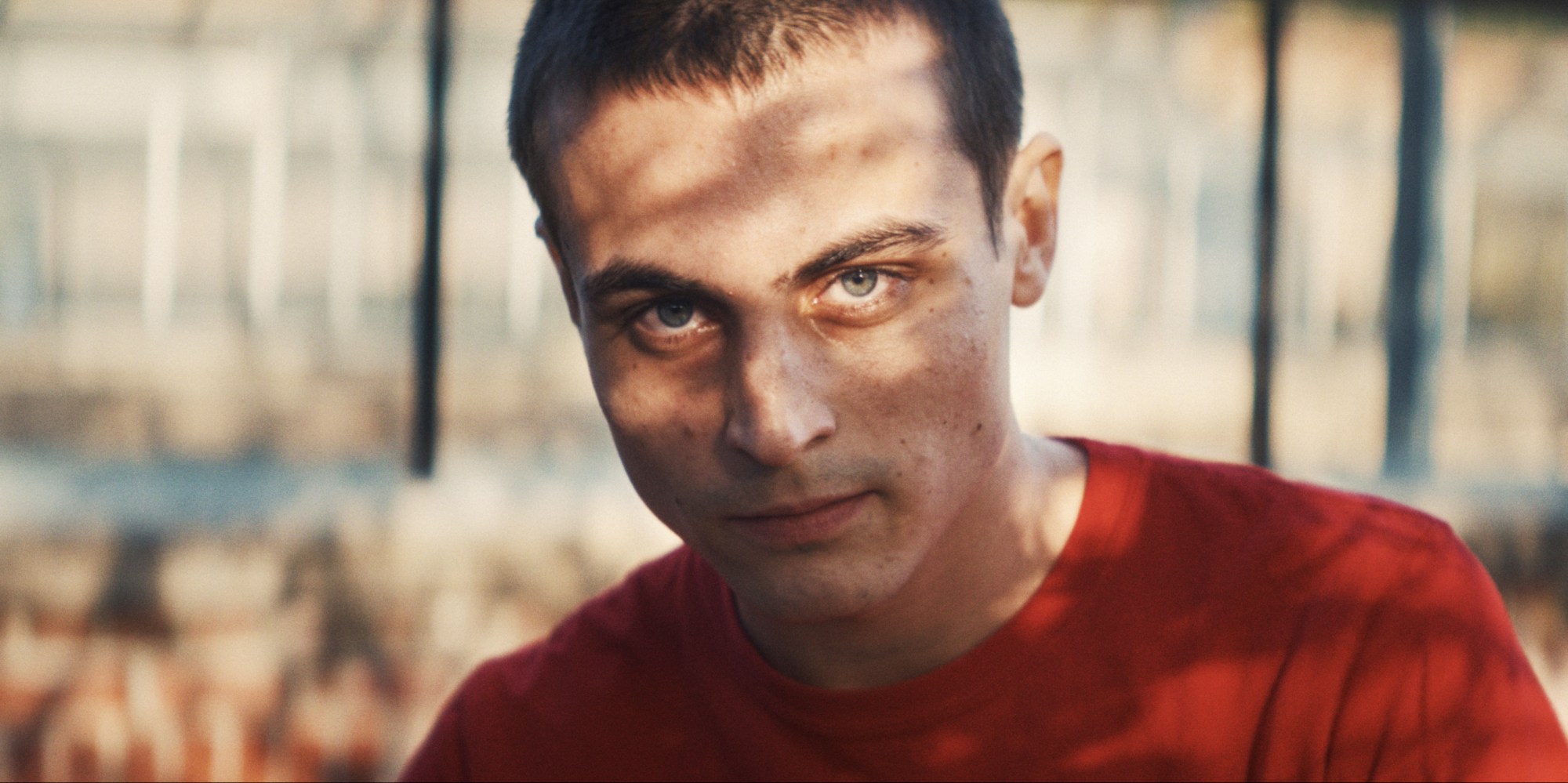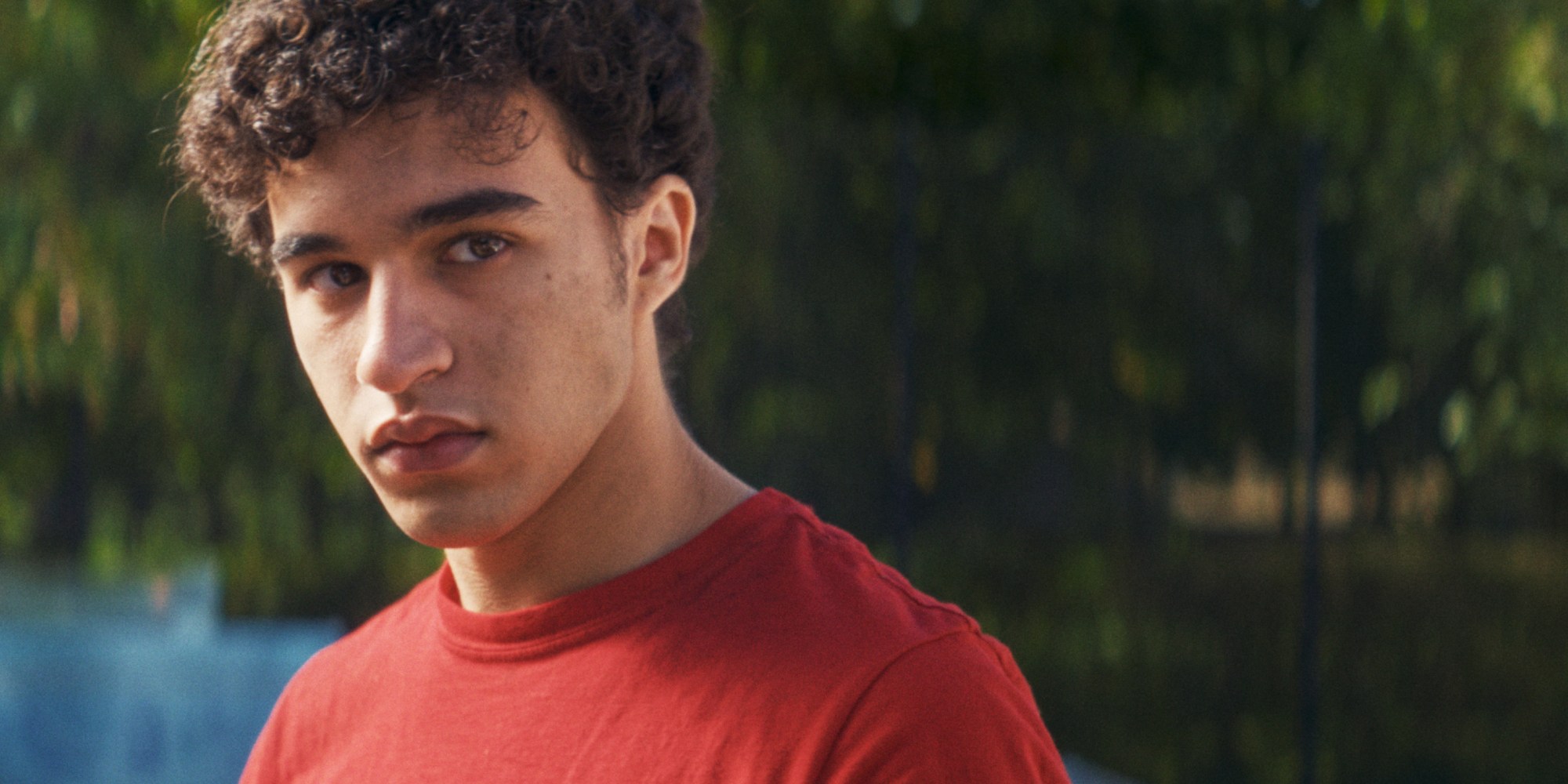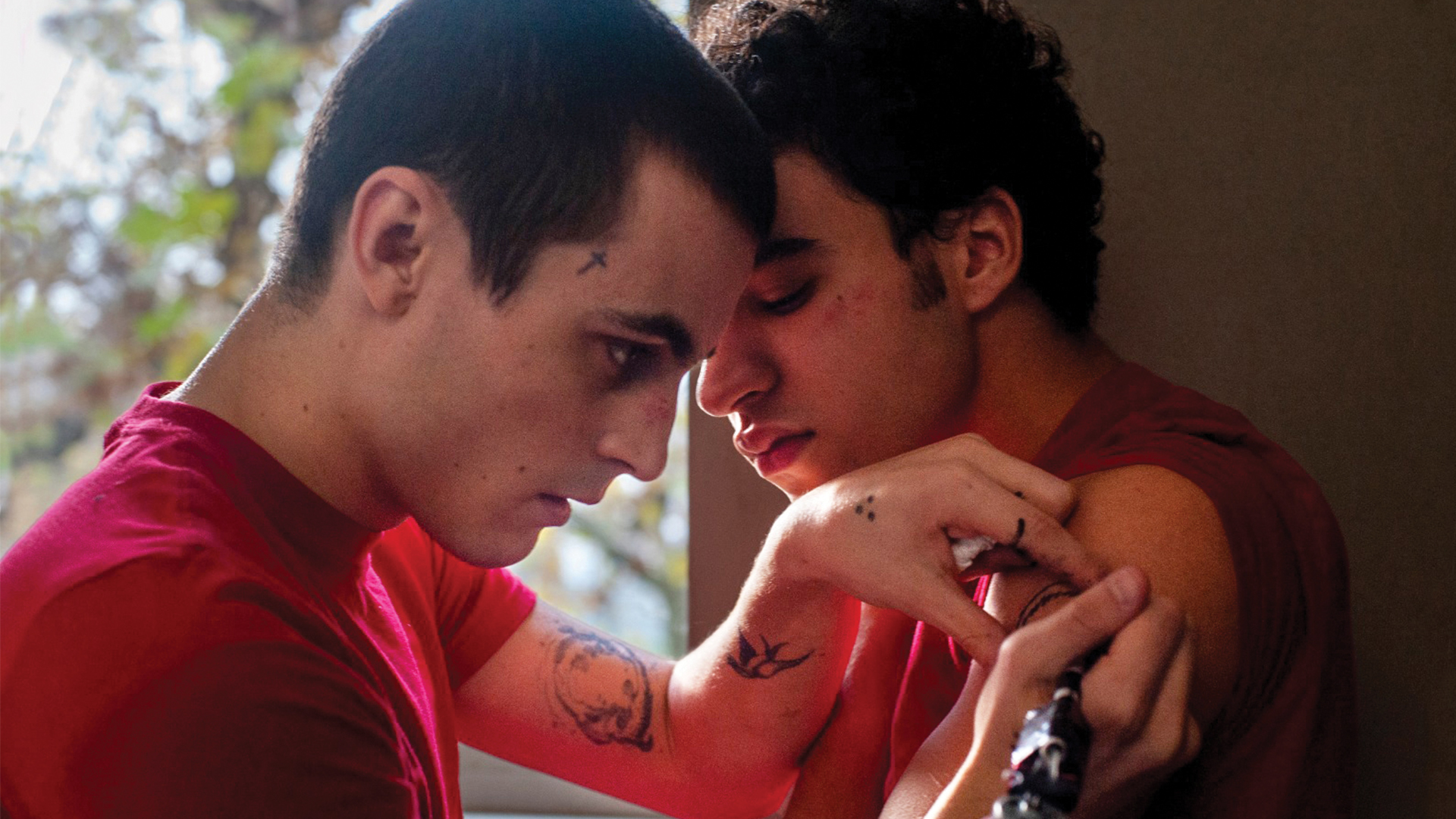Zeno Graton’s debut film The Lost Boys follows two teenagers in a juvenile detention centre who, stuck in a system that has no interest in their release or rehabilitation, discover hope and possibility in each other. Its protagonists, Joe (Khalil Ben Gharbia) and William (Julien De Saint Jean), discover their feelings for each other with a passion that is unshackled from shame, and with the full acceptance of their peers, but this internal liberation collides with their literal confinement. “It’s a metaphor for a society that is still a prison for queer youth,” Zeno says. “They still live in a world where it’s going to be difficult for them to love who they want, and be who they are.”
Born in Brussels and of Tunisian descent, Zeno saw the contradictions of the judicial system first-hand as a teenager when a family member went into juvenile detention. He developed The Lost Boys – which premiered at the Berlin Film Festival earlier this year under the name Le Paradis – as he identified parallels between the prison system he witnessed and the queer life he was living, curious as to what liberation could look like for people trapped in oppressive systems. To prepare, he immersed himself within a real rehabilitation centre, and observed solidarity, tenderness and love between the imprisoned young men.
Zeno spoke to i-D about capturing the brighter and softer shades of the harsh prison environment, imagining utopian worlds through cinema and the everlasting influence of history’s literary queer icon Jean Genet.
In The Lost Boys, Joe falls in love with William just before he’s due to be released from a juvenile detention centre. How did you want to play with the definition of liberation, particularly through the lens of queer youth, in the film?
The goal was to talk about struggle and resistance, and how liberation is only attained and gained through fight and resistance. I also wanted to talk about how being free, for both me and this character, is to be in love, and to be connected with someone.
It was very important for me to portray these young men being empathetic towards each other, and tender, and trying to portray masculinity differently in a utopian way. It’s about this young generation against the system more than against each other. It was very important to me to portray this camaraderie and this profound, intimate family feeling that creates power.
Did you witness that camaraderie and tenderness when you went to the rehabilitation centre?
It was a really life-changing experience, because these kids are very witty, clever and interesting. I felt that anything that was trying to contain them would not succeed – all these programmes, the psychology, the training, nothing was enough to dim their light. These people have always been outcasts, even when they were outside. When they’re in, the only chance that they have is actually to create a bond that is going to be strong enough to protect themselves from the brutality of these places.

Did you observe anything that you felt was genuinely rehabilitative for them?
Yes, what struck me the most — and what developed into something that appeared in the script — is the educators, and how they care 100 per cent for the kids. They really want to rehabilitate them, but most of their actions are somehow limited and confronted by a system that is dysfunctional. I want to add that the system [in the system’s eyes] is not dysfunctional; the system works very well, because the aim of the system is maybe not to rehabilitate them. As you read through Michel Foucault or Angela Davis‘ books about prison, you find that those places are meant to put people aside because of their race, gender and class. This is how the system is crafted, but inside of it, you have people with values.
Khalil Ben Gharbia and Julien De Saint Jean are brilliant, and I understand you gave them a lot of freedom to explore the characters. Did anything in particular surprise you?
In the beginning, I took them to an actual centre and they spent several days there. It was very important for them, for their craft, to go on set with this sense of humility and this sense of responsibility to tell the story of the people they saw. One of the things the kids said to them was that they didn’t believe that a film was going to be made about them, because, they said, ‘Nobody cares about us’. I think this was a turning point for the actors of, ‘Okay, we need to work, we need to craft, we need to prepare’.
I found the way you framed queer romance, with restraint and a focus on tenderness and care, really rare and moving. Why did you want to illustrate Joe and William’s connection in that way?
For me, love is really about holding each other. For me, it was more subversive to show tenderness in a queer story than to show sexuality. I wanted to spend more time filming hugs or tenderness or caresses than actual sex, because I felt those images were already done. Queer stories that revolve around, ‘Are they going to kiss? Are they going to come out to themselves and love themselves?’ — the story of those films stops where my life began, after coming out. It was to tell the audience that this is not a movie about them trying to kiss each other, it’s a movie about how they’re going to love each other, and how infinitely, immensely conflictual love is.

One of the most tender moments in the film is when Joe plays music on the radio for William through the wall.
I cannot leave this interview, actually, if I don’t talk about Jean Genet. That radio is really about his novels and his famous short film called Un Chant d’Amour (A Song of Love), which is a love story between two prisoners who are separated by a prison wall. It’s about how queer people try to connect but are separated by a wall — society, basically — but their tenderness is stronger than the wall and their love can pass through it.
That’s what Jean Genet told us 50 years ago, which was so very avant-garde. His stories were full of flamboyant characters and characters who love themselves, and even trans characters in the 50s, which for Jean Genet was not even an issue. It was genius, and he’s someone I look up to a lot. The movie is basically an homage to Jean Genet.
What’s the first Jean Genet novel a young queer person should read?
His first, Journal du Voleur.
Your background is in cinematography, and the film is beautifully shot by Olivier Boonjing. How did you map out how you wanted to illustrate this world?
When Olivier and I started working together, we talked mainly about the fact that we wanted the movie to look like a very good romantic love story, and not a sad, ‘social issues’ story. It had to have this flamboyance, a wide CinemaScope with colourful, moving images. We used anamorphic lenses that give an aquatic vibe, with very soft lenses to depict this tenderness. It’s the lenses that were used in Moonlight, which we were very inspired by that kind of movie, and Happy Together by Wong Kar-Wai.
The choice of creating a queer leading Arab character was also very important to me, because the representation of Arab characters, not to mention queer Arab characters, is always the same to me: [they are either] an object of fetishisation or of victimisation. I really wanted to create a character that could be the subject of his own story, that could have his own drive towards who he loves, and that could have pride about it, or at least no question about it. Often race is used to depict characters that have problems with their sexuality, and I think it’s a narrative that is outdated. I made the movie I wanted to see to create those missing images.
‘The Lost Boys’ is in UK cinemas and on digital platforms from 15 December.


